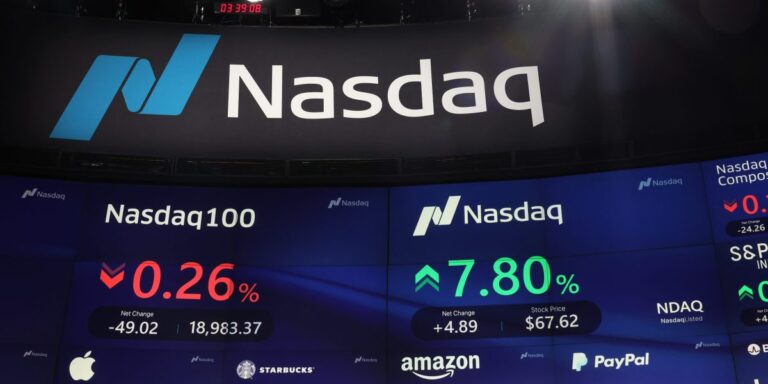The Nasdaq 100 Index is in the midst of a correction after dropping 8% in just over two weeks due to a fierce withdrawal by big tech companies. Avoiding this questionable milestone will depend on the earnings of four companies worth nearly $10 trillion combined.
The week also sees the Federal Reserve’s interest rate decision, and investors will be primarily focused on Microsoft’s earnings report on Tuesday, followed by earnings reports from Meta Platforms Inc, Apple Inc and Amazon.com Inc over the next two days.
The stakes were already high after a surge in Big Tech stocks in the first half of the year sent share prices and company valuations soaring for the biggest companies. The stakes became crucial last week after Alphabet Inc.’s earnings report raised concerns that spending on artificial intelligence was excessive relative to near-term profits.
“These returns are really important,” said Michael O’Rourke, chief market strategist at Jones Trading. “If they don’t beat expectations, that will be interpreted as a sign that the AI isn’t performing as well as people expect it to.”
The results will come as a market is rocked by its fastest, sharpest rotation in years. After months of ignoring warnings that they were overinvesting in companies at the forefront of AI, investors are finally turning cautious toward these companies. They have dumped $2.6 trillion worth of the Nasdaq 100, pouring money into long-lagging names like smaller companies and financial and industrial companies. The index recovered slightly on Friday, up 1%, but that’s far from making up for losses earlier in the week.
The market’s return to cyclicals began in earnest after a June price index showed inflation subsiding, raising hopes the Fed could cut rates as soon as September. The Russell 2000 has risen 10% since then, while financial and industrial stocks in the S&P 500 have risen more than 3.5%. Investors will get a better idea of the outlook for rate cuts when the Fed releases its policy statement on Wednesday and Chairman Jerome Powell speaks.
Amid the changes, traders are buying more options on the Invesco QQQ Trust Series 1 ETF, which tracks the Nasdaq-100 index, to protect against further declines. Bearish put premiums have risen to their highest in eight months. The Cboe Volatility Index rose above 18 this week for the first time since April, while a similarly volatile measure of the Nasdaq-100 index has reached its highest level since October, when the index last corrected.
“This is what happens when you have a narrow market and everyone relies on the same few stocks,” said Michael Matousek, head trader at U.S. Global Investors.
The first test will be Microsoft. The software giant has been integrating AI services into its software suite and investing heavily in expanding its data center capacity: In the third quarter that ended in March, the company spent $11 billion on capital expenditures; that figure is expected to grow to more than $13 billion in the fourth quarter.
Meta Platforms, which reports earnings on Wednesday, and Amazon, which reports on Thursday, are also big spenders, and investors will be looking for signs that AI is making a difference in their bottom lines.
Apple shares have risen 32% from an April low on optimism about the company’s plans to integrate AI services into its iPhones, and investors will be focusing on further details in Thursday’s announcement.
“There’s growing concern that payback from big AI spending is either still a long way off or not as profitable as thought, and that’s rippling across the semiconductor chain and across AI stocks,” said James Abbate, chief investment officer at Center Asset Management.
The sell-off continues among high-flying AI stocks. Nvidia, the industry leader, is down 17% from its peak on June 18, when it briefly overtook Microsoft and Apple to become the world’s No. 1 company. Dell Technologies, which makes servers used in data centers, is down 37% from its May peak. Rival Supermicro Computer Inc. has fallen 40% since March.
Six big U.S. technology stocks have driven much of the S&P 500 Index’s 14% gain in the first half of the year, with market-capitalization-weighted indexes beating their peers by the largest margin since 1999. The S&P 500’s information technology index hit its highest price-to-earnings ratio since 2002 earlier this month, and valuations have soared.
“Big tech companies are trading at perfect prices and have accounted for nearly all of the market rally, highlighting the fragility of this group,” Abate said.
CEO Daily provides essential context for the news business leaders need to know. More than 125,000 readers trust CEO Daily every weekday morning for insight on and from the C-level. Subscribe now.


